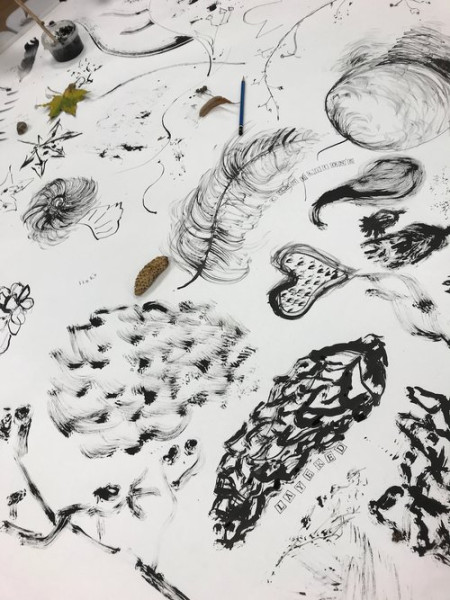Well-City Salisbury offers creative courses and opportunities for adults and young people
experiencing low to medium mental health needs. Activities will require the use of fine motor skills, like using a pencil. Some courses will involve physical elements like walking and will include sessions that take place outside.
A Well City Salisbury creative course for wellbeing from Wiltshire Creative and artist Elizabeth Hammond.
Connections. Nature. Balance. Expression. Attention. Freedom.
This course is about discovering and harnessing the benefits of nature through art for wellbeing, from the comfort of our own homes. Participants will take time together to notice and explore the beauty of our changing landscape as we move from Winter to Spring using objects found in nature.
Everyone needs nature as an aid to wellbeing, and by connecting with it in a meaningful way through creativity we can build a continued connection with place, each other, and ourselves. This course will also invite you to explore nature around you creatively between the online sessions.
You will be taught techniques needed to continue creative explorations, following the conclusion of the project, to supply lasting benefits to your creativity and well-being. Techniques will include drawing with graphite, ink, and charcoal; using wax resist; clay and collage.
You do not need to have experience or even consider yourself artistic to take part, sessions will be accessible for beginners. All materials and tools will be provided.
This course will be delivered online via Zoom. Digital Support and device loans to take part are available. Request by getting in touch with our project coordinator. Welcome session will take place on 10th January.
Please read the following to ensure that courses are appropriate for your needs:
• Well-City Salisbury is for those living, or for young people attending education, in Salisbury
and the surrounding areas. Participants should have an SP1-SP5 postcode.
• Courses are ideally suited to those experiencing low to medium mental health needs, like
anxiety, stress, low mood, and depression and those struggling with feelings of social
isolation.
• Participants should not be in a mental health crisis and should not present a risk to either
their own safety or that of others.
• Participants should be able to attend regularly without a support worker or carer (we
welcome support workers and carers to the first couple of sessions if this is helpful for
participants to feel more comfortable in a new space and meeting new people).
• Participants should be comfortable in a group setting or want to work towards becoming
more comfortable in group settings.
• We offer courses mainly for adults (20+) with 1-2 specific courses for young people (ages 14-
19) offered each year. There is no upper age limit.
• Because of the nature of some of our courses, the activities involved and where they take
place (such as walking on uneven ground), participants should consider their mobility needs
in relation to the suitability of some of our creative courses.
• Courses are open to people of all abilities though for safety reasons participants should be
able to follow instructions and participate in activities with minimal supervision. We’re not
able to offer 1:1 support for participants.
• Participants should be receiving support to disengage from drug or alcohol addictions if this
is a part of their mental health need. Participants cannot attend sessions while under the
influence of illegal drugs or alcohol.
• Participants should be able to commit to attending all sessions (although we understand, of course, that sometimes unexpected things come up).
• We encourage participants to seek a referral onto a creative course from their GP practice,
support organisation, community group or school wellbeing team if possible. However, we
also welcome self-referrals. If self-referring, we ask you to provide details of someone who is
able to support your mental wellbeing if need be and has been informed you are participating in the creative course.
Courses have a limit of 12 spaces per course, first come first served and participants can take in a maximum of 2 courses per year.


